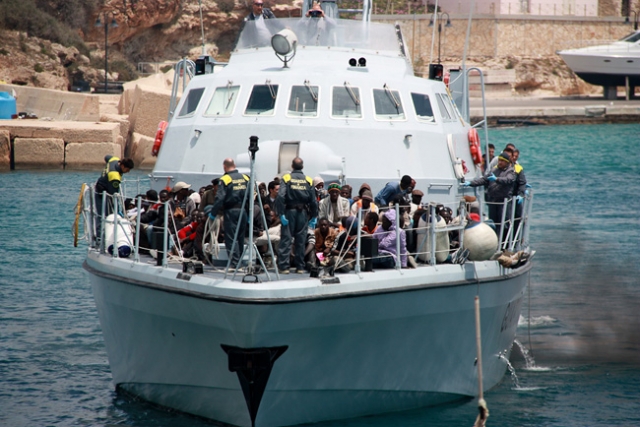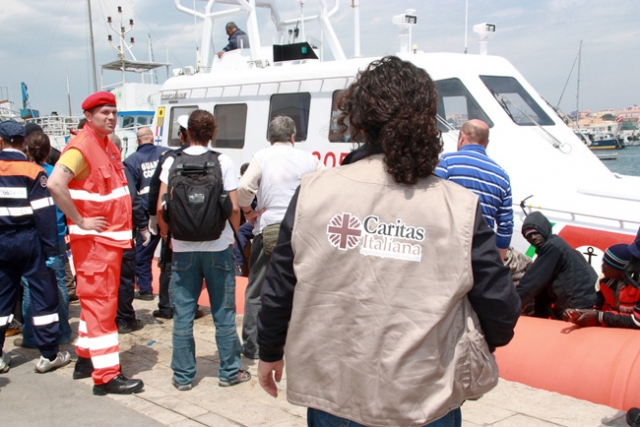
Migrants arriving at Lampedusa. Credit: Caritas
We live in a world today which seems like science fiction compared to the one I grew up in. If you have a computer, you can stay at home and videochat with friends in another country, shop and bank online and access whole libraries of information. This is our globalised world today.
Unfortunately, rather than creating the conditions for a “globalisation of spirit” where we live in a state of peaceful co-existence and fraternity, we are increasingly experiencing a “globalisation of indifference”.
This is what Pope Francis spoke about during mass on the Mediterranean island of Lampedusa in July 2013. It is a place where thousands of migrants have died – drowned at sea – trying to reach Italy.
I’ve been thinking about the Pope’s visit to Lampedusa as I prepare to speak at a major migration conference in Washington organised by Catholic Charities USA, the US Bishops’ Conference and the Catholic Legal Immigration Network. [Read my speech here]
We have worked so hard to break down the barriers to trade, travel and communication and yet we build walls and fences to stop the movement of people. Many migrants don’t have the option of staying at home to surf the net and to take advantage of this globalised world because not only do many not have a computer, but often they can’t even afford to provide their children with regular nutritious meals.
While there is inequality, poverty and a lack of opportunities in many countries people will have no option but to leave if they want themselves and their families to prosper. It is a question of human rights but also, quite simply of humanity.
Quite often, the richer a person or a country becomes, the higher the barriers they build between themselves and others. The fear of losing what they’ve got becomes more powerful than their love and responsibility towards others.
A year after his visit to Lampedusa, the Holy Father has written to the Archbishop of Agrigento, Sicily in a “spiritual revisitation” to the island and to throw “blossoms of prayer” into the waters for the suffering of the women, children and men who flee poverty and wars in search of a better of a better life. [Read the Pope’s message in Italian]
The Pope says that the migration crisis needs to be faced not with the “logic of indifference” but with the “logic of hospitality and sharing” so that we can promote human dignity.
For any person of faith, there is no clearer message of how we should respond to migrants than the story of the Good Samaritan. Welcome the stranger. Feed him, bathe his wounds and take care of him. Welcome the one who is different to you.
The migrants who arrive at our borders are often frightened and traumatised. They have taken their courage in their hands and have embarked on a journey of thousands of kilometres with no guarantee of success. They may have faced trafficking and abuse and hunger. But when I look at how the international community is reacting to the migration crisis, I wonder who’s the most afraid: the migrants or the countries where they’re heading?!

Caritas in Lampedusa provides help to the newly arrived migrants. Credit: Caritas
In some parts of the world, migrants – including children – are locked up in cells and made to sleep on concrete floors. The authorities seem to not even consider the person’s dignity or the psychological damage inflicted by detaining the migrants like prisoners.
The walls and fences will never be high enough nor strong enough keep millions of migrants from their destinies because they have courage, strength and determination on their side. If their countries offered the migrants opportunities and a dignified life, they would stay at home and use these qualities and their talents to invest in the building of their own countries.
Pope Francis encourages us to offer a welcoming hand to the migrants arriving on our shores and at our borders. He invites us to do this without fear and with tenderness and comprehension.
Can we have courage, strength and determination to match that of the migrants so we are able to welcome them, to help change the systems which mean their countries stay poor while others get rich and to build a globalisation of solidarity?
To do this, we need to break down the barriers within ourselves before anything else. Maybe we can start by offering “blossoms of prayer” for those who have died on the migrant journey and for those who are still travelling.
